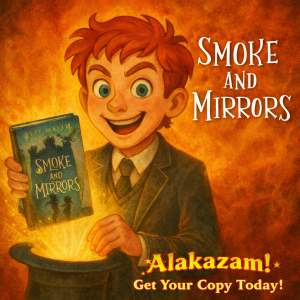For our January Reader Contest, we asked our members to write a short essay on a Havok story that touched them deeply, and why it mattered to them. Havok’s community is full of readers who are authors and authors who are readers, so the love of a great story is a shared passion for all of us.
Now let’s hear about this in their own words!
Our winning essay, written by Ryan Bush:
Opening lines are difficult, and although people often try to come up with a cool and memorable start to a story, I usually find they just end up gimmicky and forced. However, The Curse of the Were-Cupcake’s opening sentence about being licked was a killer line, hooking me into the tale right away.
In just 1,000 or so words, Abigail Falanga managed to create a hilarious tale about the citizens of a town transforming into random objects during a full moon. Her visual descriptions did a great job of creating mental images for me as I read along, and I had a great time imagining this wild and whacky moonlit night. The idea of a cupcake sprouting little legs and running along, then screaming in a high-pitched voice at a dragon was particularly bemusing. And the ending, where the cupcake and his crush-turned-rescuer ran into a house, felt particularly witty to me since it was essentially a were-house (get it, warehouse? Ha!)
I also thought The Curse of the Were-Cupcake added some nice elements alongside the wacky humor. As an archaeologist, I’m a sucker for ancient artifacts in stories, so I was very pleased to read that the town curse happened because historians opened an ancient sarcophagus and triggered a curse. I also thought the were-cupcake’s awkward attempts at talking to his crush were rather fun and funny!
This story just stuck with me, and when I saw the prompt asking for people to share their favorite Havok stories, it was the first one that popped into my mind. I hope more readers will go back and check it out, it’s certainly a funny and enjoyable tale!
Don’t remember this tale? Or interested in a reread, now that you’ve seen it through his eyes? Read The Curse of the Were-Cupcake (note: the archives are for members only).
Runner-up #1, by Arlan Gerig:
I will forever detest the scent of coconut mixed with vanilla bean, thanks in part to Beka Gremikova’s story, The Perfumers of Qukamar. Her character Shebalik describes it as “cloying,” and I sympathize with him when I come across that sickeningly sweet scent. As he accurately complains, it makes the head swim.
I love the story’s vivid descriptions of cloying coconut and vanilla, cursed on Shebalik because he dared criticize his girlfriend’s favorite scent. He prefers the brisk aroma of orange and brine.
I discovered Havok after receiving a depressing note from an editor about my clunky sci-fi manuscript. She suggested Havok as a place to read well-crafted stories and submit my own. Beka’s story was the first one I read, and it fired my imagination with her incredible world-building, sympathetic characters, and thoroughly enjoyable story in less than a thousand words. Beka’s well-crafted story gave me the joy and anticipation I had been looking for.
I was so enraptured that I became a member that same day.
Although Beka never wrote a sequel to Shebalik and Miryam’s blossoming romance, The Perfumers of Qukamar will forever live in my imagination. I will also remember Miryam’s favorite exclamation, “Scepters and scimitars!”
It was the first of many Havok stories I’ve enjoyed reading. It has a gentle humor typical of Beka’s style and an intriguing character arc that culminates in a satisfying conclusion. I will also continue to avoid the oversweet scent of coconut and vanilla bean.
If you’d like to immerse yourself in the scents and sounds of the perfumeries, read The Perfumers of Qukamar.
Runner-up #2, by Currer Bell:
The spirit of flash fiction is simply this: use your limited words well.
The Havok story that’s impacted me most, Katherine Vinson’s Words, captures that, although not in the manner you’d expect.
The narrative is an evocative plea from a distant future where people are allotted 1000 words each day. It keeps things simpler— more efficiency, less insincerity. If you use your words cruelly, they count double or more, diminishing your count faster with each unharmonious word spoken. Use them wisely, and they’ll roll over for another time. These future people’s lives revolve around words, but those words are strictly regimented by Verbionics, the ones who distribute and maintain everyone’s Word Counters. Why waste words on such simple things as greetings or gratitude? Why spare them on conversation? You’ll only be considered a chatterhead, one of the few who wastes oxygen, words, and other’s time.
But our narrator tells us of a loophole, discovered by accident.
While negative words subtract from an individual’s count, gracious words add to your allotment. Not only common courtesies— words like “thank you,” “please,” and “you’re welcome” —but personal things. “I love you.” “You’re amazing.” With this knowledge, the narrator begins to speak openly.
They are, of course, discovered by those who run the Verbionics system, and imprisoned, their counter taken to enforce silence. But, the narrator tells us, they believe the loophole was intentional— that the system’s creators meant to encourage loving and kind speech. So, hacking their reader, they’ve sent out a broadcast, using their remaining words to beg others to use their words as intended, for “They can silence one, but they cannot silence thousands.”
Each time I read Words I weep, and am challenged anew. Do I use my words as a precious commodity, as a gift, or with reckless negligence?
Read Words and experience the dystopian world of the Verbionics system. Access to our entire collection of 1,400+ stories all year long is only $4.99.
As always, we’d like to thank our authors for letting us into their worlds, and our readers for joining us in exploring them!






Tell us your thoughts!